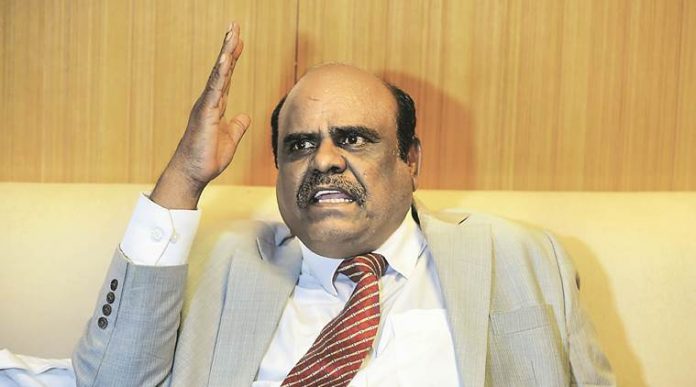SUPREME COURT v. JUSTICE KARNAN
(All that you need to know about the curious case of J. Karnan)
There are series of events which raises questions and one of them is a very important one i.e. is there any law to discipline judges. The judiciary is one of the important mechanisms of our society whose job is to give correct interpretation of laws and to fill the vacuum between the society and the law. But what happens when the judiciary instead of filling the vacuum starts taking advantage of this vacuum.
The Judges (inquiry) Act, 1968 has time and again failed to discipline judges. The said Act talks about impeachment of judges but does not address infractions that are not serious enough for impeachment.
Justice C.S Karnan of the Calcutta High Court has been on headlines lately because of his indecisive behavior. But this is not the first time that the honorable Judge is in trouble. His behavior with fellow judges in Madras High Court was found to be so offensive that 21 of them signed a complaint against him.
On 23rd January Justice Karnan wrote a letter to the Prime Minister urging Prime Minister Modi to go through the initial list of corrupt Judges of Madras High Court and also requested the Prime Minister that these officials shall be interrogated by the officers of central agencies.
On 8th February, 2017 the Supreme Court took judicial note of several letters with serious allegations of corruption and bias against members of the judiciary over the last three years. The apex court on 10 March, in another unprecedented move, issued a bailable warrant against him as Karnan failed to appea,. The Court issued contempt notice against Justice Karnan for alleged judicial indiscipline.
In response to this the honorable Justice accused them of harboring a caste bias against him. He accused the CJI J S Khehar led seven judge bench of upper caste bias in initiating the proceedings as he belonged to the dalit community. He challenged the order as being an offence under the law and to punish atrocities against Dalits and tribals and challenged the court to refer his case to parliament.
He also asked the CJI and six judges of the Supreme Court to appear before him at his “residential court” on April 28. Later in an order, he directed the Air Control Authority in New Delhi not to allow the CJI and other six judges to travel abroad.
Currently the Supreme Court ordered medical examination of Justice CS Karnan and to this he replied by passing an order for psychiatric examination of the seven judges of the apex Court who heard case against him. The Supreme Court directed the Kolkata government hospital to carry out the medical examination of the judge.
Justice Karnan had on 4 May declined to undergo a mental health checkup as ordered by the Supreme Court, telling a team of doctors he is “absolutely normal” and has a “stable mind”.
Contempt proceedings against Justice Karnan were initiated suomotu by the bench. The bench restrained the judge from performing judicial and administrative work also.
He named members of the apex court’s seven-judge bench, comprising the
- Chief Justice of India, J S Khehar
- Justices Dipak Misra,
- J Chelameswar, Ranjan Gogoi,
- Madan B Lokur,
- Pinaki Chandra Ghose and
- Kurian Joseph.
On 8th May 2017, Justice Karnan while awarding the ‘sentence’ said the eight judges (as, later, J. Banumati was also added to the list) have jointly committed the offences that are punishable under the Scheduled Caste/Scheduled Tribes Atrocities Act of 1989 and the amended act of 2015.
On 9th may 2017, Supreme Court created two firsts in judicial history- it jailed sitting high court judge C S Karnan for six months, convicting him for contempt of court.
Recently, his recall petition has been rejected by the Supreme Court.





